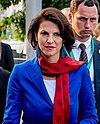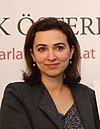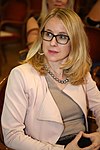Second Kurz government
| Kurz II government | |
|---|---|
Cabinet of Austria | |
| 2020 | |
 | |
| Date formed | 7 January 2020 |
| People and organisations | |
| Appointed by | Alexander Van der Bellen |
| Chancellor | Sebastian Kurz |
| Vice-Chancellor | Werner Kogler |
| Member parties | People's Party The Greens |
| Status in legislature | Majority coalition (2020-present) |
| No. of ministers | 15 (+2 State secretaries) |
| Opposition parties | Social Democratic Party Freedom Party NEOS |
| Opposition leader | Pamela Rendi-Wagner (SPÖ) (2020-present) |
| History | |
| Election(s) | 2019 legislative election |
| Predecessor | Bierlein government |
The Second Kurz government (German: Zweite Bundesregierung Kurz or Kurz II for short) is the current national government of Austria as of 7 January 2020. It was sworn in by President Van der Bellen.
The Kurz II Government succeeds the Bierlein government, a nonpartisan caretaker administration installed to run Austria following the collapse of the first Austrian government led by Sebastian Kurz in the wake of the Ibiza scandal involving his coalition partner, the far-right Freedom Party.
The termination of the coalition of Sebastian Kurz's ÖVP with the FPÖ was followed by a vote of no confidence in parliament and a snap election in September 2019, in which voter support for the FPÖ dropped and support for the Green Party surged to its highest level ever. The ÖVP, rejuvenated under Kurz, rebranded as the New People's Party, and given a new signature color, emerged victorious; it did not achieve a parliamentary majority in the National Council, however, and therefore had to look for a junior coalition partner. With two coalition variants with other parties already having failed, Kurz turned to the Greens.
Kurz II is the first government in Austria that is majority-female and also the youngest on average in history. Sabastian Kurz (also informally called "Basti" and dubbed Wunderkind at home and abroad)[1] will reclaim the distinction of being the youngest head of government in Europe, aged only 33. The youthfulness of the government also mirrors a younger electorate, Austria having lowered the voting age to 16, the lowest in Europe.
A novel form of political partnership: ÖVP with Greens
Sebastian Kurz, leader of the centre-right ÖVP, reached an agreement on a coalition with the centre-left Greens at the end of 2019, making him Chancellor of Austria for the second time, and Werner Kogler, leader of the Greens, Vice Chancellor. This will be the first time that the Greens will be represented in the executive branch of the Austrian government at the national level, although they have already served as coalition partners in several state governments.
The novel form of a political partnership paves the way for the ÖVP to maintain its hard line on immigration, but also puts Austria on the forefront of the fight against climate change, with a Green minister in charge of that portfolio, and an action plan towards carbon neutrality on a pace faster than the rest of the EU.[2] Kurz and Kogler differ dramatically not only in age, but also in dress, mannerisms, style, and manner of speech. Notwithstanding the odd-couple nature of the match, they have developed a good working relationship characterized by mutual respect.
Unlike Kurz, Kogler had to obtain the approval of his rank and file to enter the coalition government on the terms spelled out in the coalition agreement that the two party leaders had finalized and announced on New Year's Day. This was required by the charter of the Green Party, which reflects its founders' commitment to grassroots democracy, while the ÖVP is more hierarchical and dominated by its constituent organizations in the corporatist tradition.
On 4 January 2020, more than 93 percent of the delegates at a national Green Party Congress convened in Salzburg backed the deal hammered out by the negotiating teams of the two parties and their leaders in more than two months of bargaining covering the full spectrum of public policies, rather than just environmental issues.[3][4][5] In the floor debate, misgivings were expressed about too many concessions having been made in reaching a deal on a joint government program that both parties, and their respective supporters in the electorate, can live with. Some delegates expressed dissent in the areas of civil liberties and treatment of asylum seekers and migrants. They deplored the Greens' yielding on core humanitarian principles, and legitimizing the degradation of human dignity by the political right, and the differential treatment of different religions.
In recognition of internal party dissension, Kogler has on many occasions stressed the need to practice political realism. Assuming responsibility for governing the country with the ÖVP offering the Greens an opportunity to participate directly in the shaping of the future course of public policy. He expressed hope to set an example for the rest of Europe with Green and Conservative parties reaching common ground on tackling the challenges of climate change through joint action, as opposed to remaining merely on the sidelines as an opposition party in parliament, which he said would have been easier.
Facing the Future with Boldness was the motto of the Green Party Congress.
In a separate floor vote, the Green rank and file approved the slate of Green ministers already designated unanimously by the party's expanded executive committee, with only one vote against and one abstention.[6]
The cabinet is yet to be appointed by President Alexander Van der Bellen, and is to be sworn in on Tuesday 7 January 2020.
Composition
The cabinet consists of:[7][8][9][10][11][12][13][14]
Actions
Notes
See also
References
- ^ Mayer, 19 10 2018 um 18:37 von Norbert. ""Newsweek" covert "Wunderkind" Sebastian Kurz". Die Presse (in German). Retrieved 6 January 2020.
{{cite web}}: CS1 maint: numeric names: authors list (link) - ^ "Austria backs green agenda with new coalition deal". 2 January 2020. Retrieved 5 January 2020.
- ^ "Die Grünen". www.facebook.com. Retrieved 5 January 2020.
- ^ "Bundeskongress der Grünen stimmt mit 93 Prozent für Koalition mit ÖVP - derStandard.at". DER STANDARD (in Austrian German). Retrieved 5 January 2020.
- ^ Sarah Wheaton. "Austrian Greens back coalition with Kurz's conservatives". Politico. Retrieved 4 January 2020.
- ^ aloh, ORF at/Agenturen (5 January 2020). "ÖVP – Grüne: Weg frei für neue Koalition – FPÖ murrt". news.ORF.at (in German). Retrieved 5 January 2020.
- ^ Article Writer. "Aschbacher soll Ministerin für Arbeit und Familie werden". Die Presse (in German). Retrieved 4 January 2020.
- ^ Article Writer. "Zwei Bauernbündlerinnen in der nächsten Regierung: Elisabeth Köstinger und Klaudia Tanner". bauernzeitung.at (in German). Retrieved 4 January 2020.
- ^ Article Writer. "Erste Details des Regierungsprogramms". ORF News (in German). Retrieved 4 January 2020.
- ^ Article Writer. "Das ist das Regierungsteam". ORF News (in German). Retrieved 4 January 2020.
- ^ Article Writer. "Österreich: Grüne entscheidet über Koalitionspakt mit ÖVP - Ergebnis der Abstimmung überwältigt". Merkur.de (in German). Retrieved 4 January 2020.
- ^ Von OÖN-Innenpolitik. "Kurz und Kogler: Die Regierung mit dem größten Frauenanteil". nachrichten.at (in German). Retrieved 4 January 2020.
- ^ Politik/Inland. "Neue Regierung: Kanzler kümmert sich künftig selbst um Medienthemen". kurier.at (in German). Retrieved 4 January 2020.
- ^ "Fleischmann unterstützt Kurz bei Medienagenden". derstandard.at (in German). Retrieved 4 January 2020.














